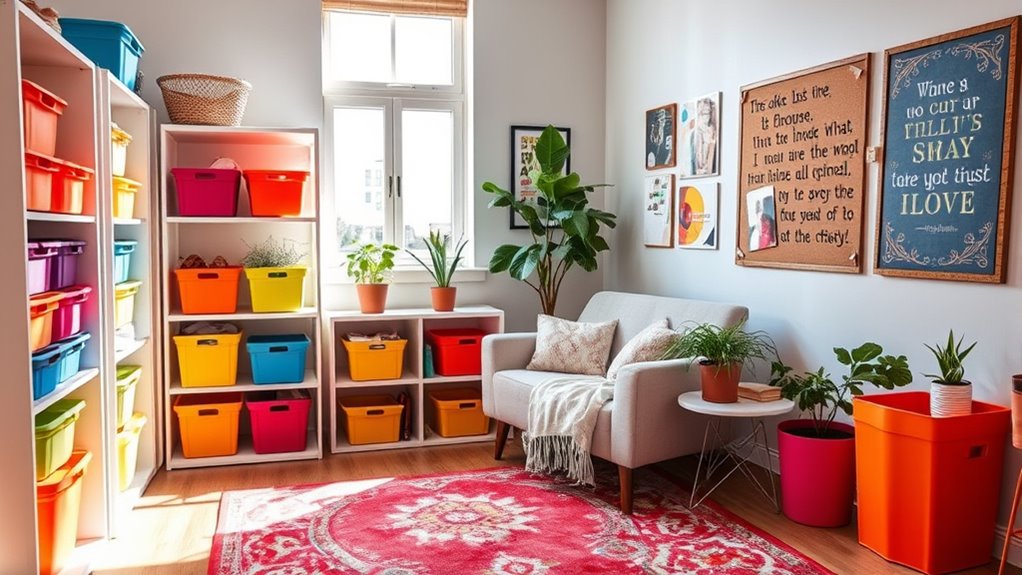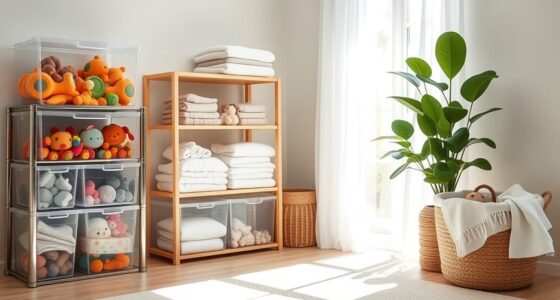Decluttering can be a fun adventure rather than a chore! Start by breaking tasks into small, manageable steps. Use engaging books like "Declutter Jumpstart" for playful challenges or "KiKi The Magical Makeover Fairy" to inspire kids. Incorporate visual aids, like before-and-after photos, to keep you motivated. Don't forget to set up a reward system for completing tasks. Keep your focus on the joy of a clutter-free space, and there's plenty more to discover!
Key Takeaways
- Incorporate gamified challenges with rewards to make decluttering a fun and motivating experience.
- Utilize visual aids like before-and-after photos to inspire progress and celebrate achievements.
- Engage in interactive journaling prompts to reflect on emotional attachments and make the process enjoyable.
- Set small, manageable goals and dedicate short timeframes to specific areas to prevent overwhelm.
- Join group decluttering sessions for accountability, social support, and fun collaboration with others.
Decluttering at the Speed of Life Book
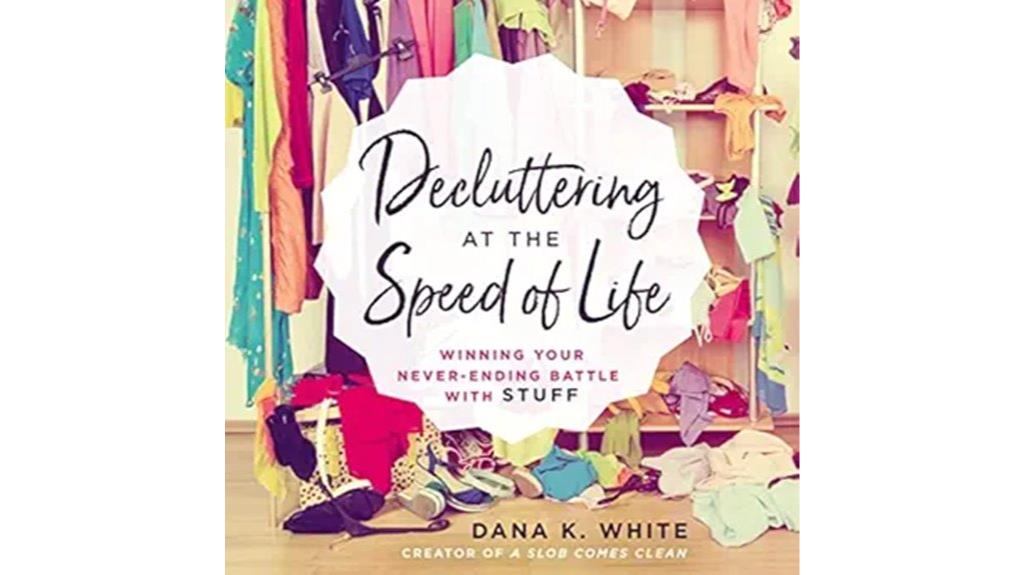
If you're someone who feels overwhelmed by clutter and struggles to keep your space organized, "Decluttering at the Speed of Life" is the perfect guide for you. Dana K. White's relatable writing style made me chuckle while I absorbed her practical strategies. She emphasizes taking small steps, which kept me from feeling overwhelmed. The book's four sections are easy to navigate, guiding me through building a decluttering mindset and tackling each room. I appreciated how Dana addressed the emotional baggage that comes with clutter, making my journey feel less intimidating. This book truly transformed my space and my perspective on organization.
Best For: Individuals who feel overwhelmed by clutter and are looking for practical, relatable strategies to organize their spaces without feeling intimidated.
Pros:
- Engaging and humorous writing style makes the content enjoyable and relatable.
- Emphasizes small steps and visible progress, making decluttering manageable.
- Addresses emotional aspects of clutter, providing a compassionate approach to decision-making.
Cons:
- Some readers may seek a deeper exploration of consumerism and emotional clutter.
- The focus on practical strategies might not resonate with those looking for more theoretical insights.
- May not provide solutions for extreme clutter situations that require more intensive intervention.
The Sentimental Persons Guide to Decluttering

For anyone feeling overwhelmed by the emotional weight of their possessions, "The Sentimental Person's Guide to Decluttering" is an invaluable resource. It motivates us to confront our clutter, especially when we worry about burdening our children later. The author suggests grouping similar items together, making the process less intimidating and more manageable. I've found that acknowledging the guilt tied to letting go of sentimental items can lead to breakthroughs. Sharing personal stories, the book resonates with those of us struggling to navigate our emotional attachments. It's a friendly guide that inspires us to embrace a more minimalist lifestyle.
Best For: Individuals with sentimental attachments to their belongings who are looking to declutter and embrace a more minimalist lifestyle.
Pros:
- Provides practical strategies for organizing and prioritizing items, making decluttering less overwhelming.
- Addresses emotional challenges and guilt associated with letting go of possessions, helping readers navigate their feelings.
- Offers relatable personal experiences that resonate with readers, fostering a sense of understanding and community.
Cons:
- Some readers may find the content basic if they are already familiar with decluttering methods.
- The focus on emotional attachments may not appeal to those looking for a more straightforward, no-nonsense approach.
- Lacks in-depth exploration of advanced decluttering techniques for those who have already made significant progress.
KiKi The Magical Makeover Fairy: A Fun Decluttering Book for Kids
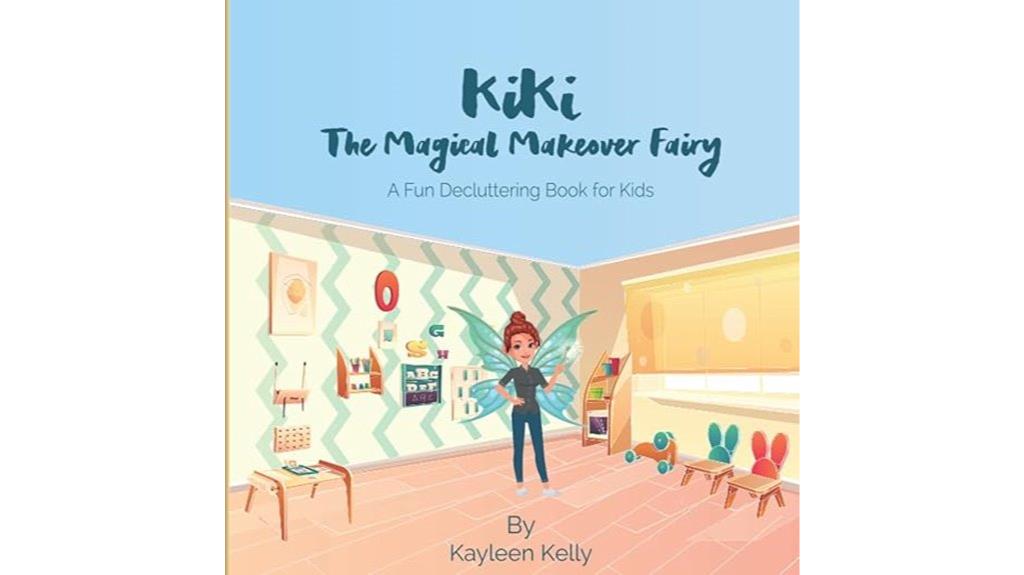
KiKi The Magical Makeover Fairy is perfect for kids who find decluttering intimidating or boring. This delightful book transforms organizing into a fun adventure with its charming rhymes and beautiful illustrations. My kids were captivated, enthusiastically applying KiKi's tips to their own rooms. One even made a daily chore list! It's amazing to see how much the book inspires them to take charge of their spaces. Plus, the parent section offers helpful guidance for us adults. KiKi encourages teamwork and makes decluttering a positive experience for the whole family. I highly recommend this gem for any household with kids!
Best For: KiKi The Magical Makeover Fairy is best for families with young children who need help making decluttering fun and engaging.
Pros:
- Encourages children to take initiative in organizing their spaces.
- Features charming illustrations and rhyming stanzas that captivate young readers.
- Provides valuable insights for parents on how to effectively involve their kids in decluttering.
Cons:
- May not appeal to older children who have outgrown whimsical themes.
- Some parents might find certain concepts too simplistic for their child's level.
- The effectiveness of the book may vary based on the child's individual personality and motivation.
Declutter Jumpstart: 30 Fun Decluttering Challenges
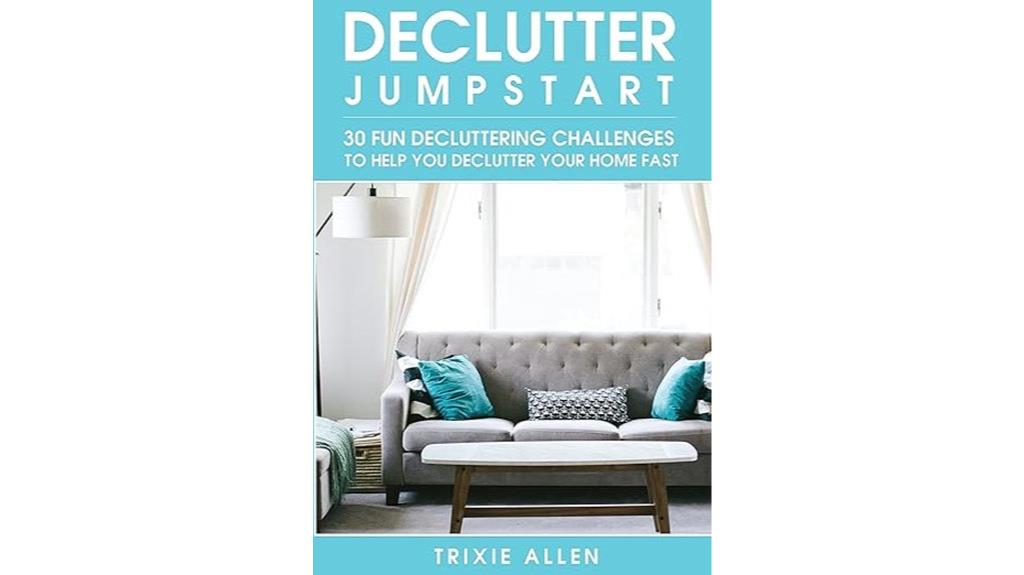
"Declutter Jumpstart: 30 Fun Decluttering Challenges" is the perfect choice for anyone feeling overwhelmed by clutter, as it offers a structured yet enjoyable way to tackle the chaos at home. I found the realistic approach invigorating; Trixie Allen acknowledges the emotional hurdles of letting go while incorporating self-care into the process. Each challenge is manageable, making it accessible for beginners like me. The practical tools and ideas helped me create a more organized space, and I felt inspired to start immediately. If you want to declutter, this book makes it fun and achievable, transforming your environment with ease.
Best For: Individuals feeling overwhelmed by clutter who are looking for a fun and structured way to declutter their homes.
Pros:
- Engaging Challenges: The book offers 30 enjoyable challenges that make decluttering feel less daunting.
- Realistic Approach: Trixie Allen addresses emotional hurdles and incorporates self-care, acknowledging the mental aspects of decluttering.
- Accessible for Beginners: The straightforward advice and practical tools cater well to those new to decluttering.
Cons:
- Limited Novelty for Experienced Declutterers: Readers already familiar with decluttering concepts may find the content less innovative.
- Potential Overwhelm with Many Challenges: The number of challenges might feel overwhelming for some, especially those who prefer a slower pace.
- Less Focus on Deep Cleaning: The book primarily focuses on decluttering rather than deep cleaning or organizing techniques.
The Home Organization Sidekick Journal by Habit Nest
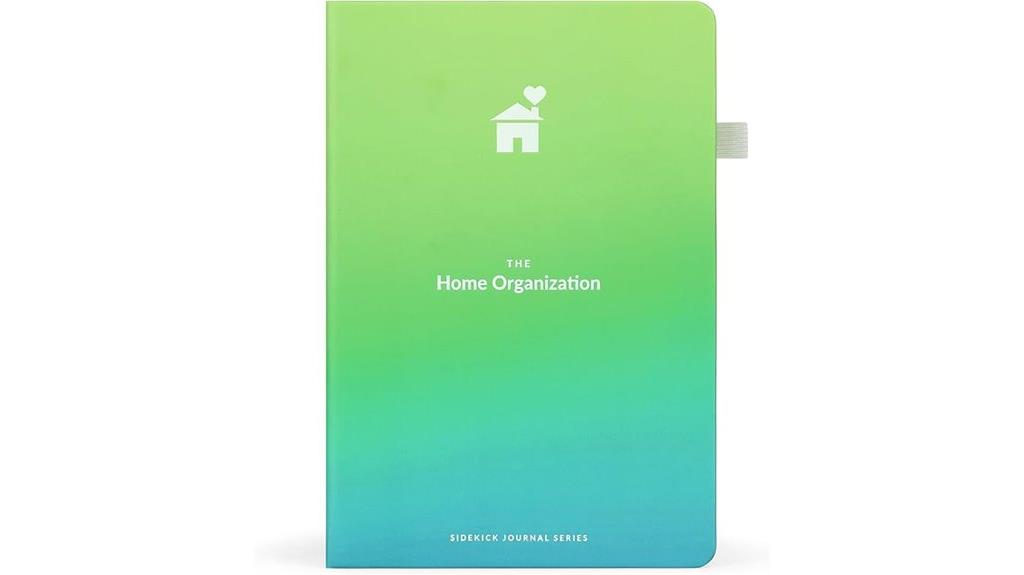
The Home Organization Sidekick Journal by Habit Nest is perfect for anyone feeling overwhelmed by clutter and unsure where to start. This step-by-step guide breaks the decluttering process into eight manageable phases, tackling one room at a time. I love how it encourages me to identify clutter and plan my organization with easy-to-follow instructions. The journal also offers emotional support, helping me reflect on how I want my home to feel. After just one room, I noticed a real difference! While it could use a section on closets, it's been a motivating and effective tool in my organizing journey.
Best For: Individuals feeling overwhelmed by clutter who need a structured approach to home organization.
Pros:
- User-friendly format with easy-to-follow instructions that guide users through each phase of decluttering.
- Emotional support provided throughout the process, helping users reflect on their desired home environment.
- Motivating tool that fosters optimism and accountability, leading to noticeable improvements in home organization.
Cons:
- Lack of specific chapters dedicated to organizing closets, which are common areas needing attention.
- Potentially overwhelming for users who prefer a more flexible or less structured approach.
- Limited focus on specific categories or zones that may require more detailed guidance.
The Executive Functioning Workbook for Kids (5 Books in 1)
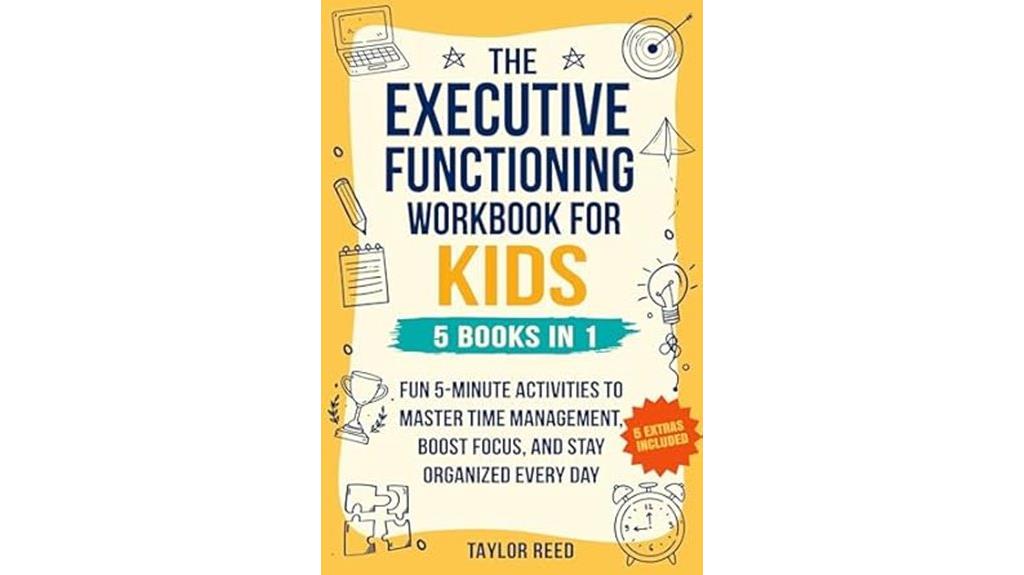
If you're a parent looking to help your child aged 5 to 12 build essential life skills, "The Executive Functioning Workbook for Kids (5 Books in 1)" is an excellent choice. This workbook offers engaging 5-minute activities that fit seamlessly into busy schedules, focusing on skills like organization and time management. I've noticed my child's focus improve through these fun exercises. With bonus materials like the "Brain Boss" chart, it feels like a game rather than a chore. The Parents' Corner provides helpful tips for guiding your child, making it a valuable resource for fostering independence and confidence in daily tasks.
Best For: Parents of children aged 5 to 12 who want to help their kids develop essential life skills in a fun and engaging way.
Pros:
- Engaging 5-minute activities that fit easily into busy schedules.
- Includes bonus materials like the "Brain Boss" chart to enhance the learning experience.
- Provides a Parents' Corner with helpful tips for supporting children through the exercises.
Cons:
- Some activities may be too basic for older kids or preteens.
- Occasional repetitiveness in the exercises reported by users.
- May not address all areas of executive functioning comprehensively.
Nobody Wants Your Sh*t: The Art of Decluttering Before You Die

Struggling to let go of those sentimental trinkets? "Nobody Wants Your Sh*t: The Art of Decluttering Before You Die" is an essential read for anyone over 60 looking to simplify their lives. This book tackles tough truths with humor, making it relatable and enjoyable. I found it inspiring and motivating, pushing me to confront my clutter head-on. The practical advice helped me develop habits to prevent future accumulation. Plus, it's a quick read that you can enjoy on Kindle—no physical clutter involved! If you or someone you know needs decluttering motivation, this book is a perfect gift.
Best For: Individuals over 60 and those struggling with clutter, particularly those needing motivation to declutter their lives.
Pros:
- Humorous and relatable tone makes the tough subject of decluttering enjoyable.
- Practical advice encourages readers to confront their belongings and develop sustainable habits.
- Quick read in Kindle format minimizes physical clutter while providing valuable insights.
Cons:
- Excessive profanity may detract from the message for some readers.
- Some may find the content repetitive, which could hinder engagement.
- Not suitable for those who prefer a more serious approach to decluttering.
Home Organization: The #1 Guide to Decluttering and Organizing Your Home
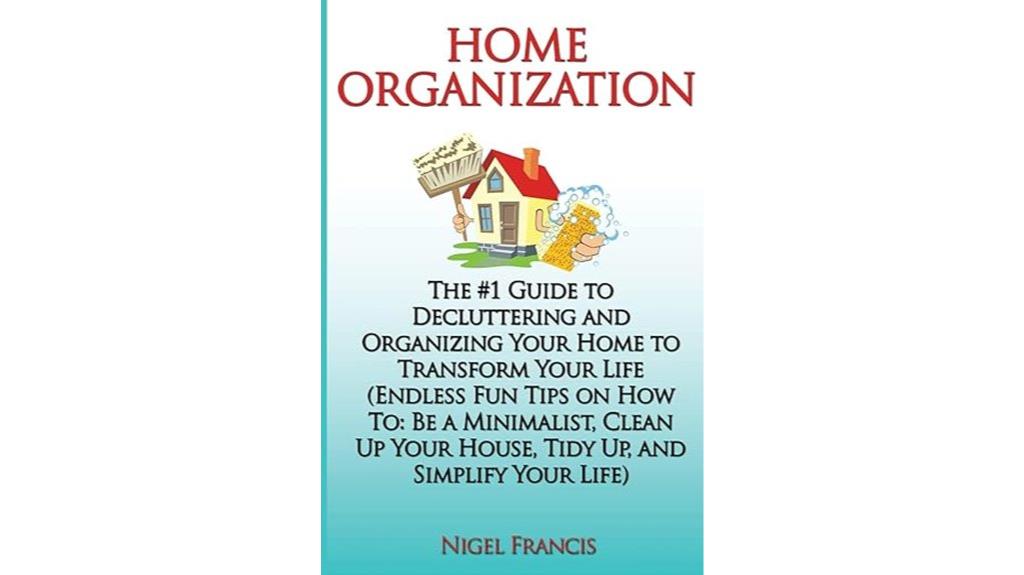
For anyone feeling overwhelmed by clutter, "Home Organization: The #1 Guide to Decluttering and Organizing Your Home" is an ideal choice. This book simplifies the challenging task of cleaning by breaking it down room by room. I love how it offers practical tips, like integrating workouts into cleaning to make it more fun. The author's personal stories make the advice relatable, and the motivational elements, like reward systems, keep me engaged. Though some may find it a bit simplistic, I believe its straightforward approach is perfect for anyone looking to transform their space and simplify their life.
Best For: Anyone feeling overwhelmed by clutter and seeking practical, step-by-step guidance to declutter and organize their home.
Pros:
- Offers easy-to-implement strategies tailored for each room.
- Integrates workouts into cleaning routines for a more enjoyable experience.
- Motivational elements like reward systems keep readers engaged in the decluttering process.
Cons:
- Some readers may find the content too simplistic and lacking depth.
- A few may feel that the initial sections detract from the main focus on practical organization.
- Not all readers may resonate with the author's personal anecdotes, which some find less relevant.
The Japanese Art of Decluttering

The Japanese Art of Decluttering is perfect for anyone who feels overwhelmed by their clutter but craves a light-hearted approach to tidying up. I found Shelby Welborn's book both humorous and relatable, making the challenging task of decluttering feel achievable. With practical strategies, it helped me let go of sentimental items and ditch that pesky "just in case" mindset. I loved the clever reward system that kept my motivation high. Plus, the way it addresses emotional attachments made me confront my guilt about keeping unnecessary things. Engaging my family in this process became a fun, collective effort too!
Best For: Anyone feeling overwhelmed by clutter who seeks a humorous and relatable approach to tidying up.
Pros:
- Provides practical strategies to help let go of sentimental items and the "just in case" mindset.
- Features a clever reward system that keeps motivation high during the decluttering process.
- Addresses emotional attachments and guilt associated with keeping unnecessary items.
Cons:
- The humor may not resonate with everyone and could be seen as trivializing serious issues related to clutter.
- Some readers may find the strategies too simplistic for their unique situations or challenges.
- Engaging family members in the process may still lead to resistance, which could complicate efforts.
Hoard Today, Gone Tomorrow: Decluttering Advice

If you find yourself overwhelmed by clutter but can't bear to part with your belongings, "Hoard Today, Gone Tomorrow" is perfect for you. This book mixes humor with practical tips, making decluttering feel less like a chore and more like a shared joke. It offers actionable steps, encouraging you to start small and tackle those sentimental items gently. The engaging style keeps you entertained while providing realistic solutions, no matter your level of hoarding. Plus, it celebrates every little victory, reminding you that decluttering is a journey. Trust me, you'll feel empowered and ready to embrace a lighter space!
Best For: Individuals struggling with clutter who appreciate humor and practical advice in their decluttering journey.
Pros:
- Engaging and humorous writing style makes the decluttering process enjoyable.
- Provides practical, actionable tips suitable for various levels of hoarding.
- Encouraging tone celebrates small victories, helping readers feel empowered.
Cons:
- Readers seeking a more serious or structured approach to decluttering may find the humor distracting.
- Those with extreme hoarding conditions might require more specialized resources.
- Some practical tips may not resonate with everyone, depending on individual circumstances.
Death & Decluttering: A Good, Clean Cozy Mystery (Spark & Joy Book 1)
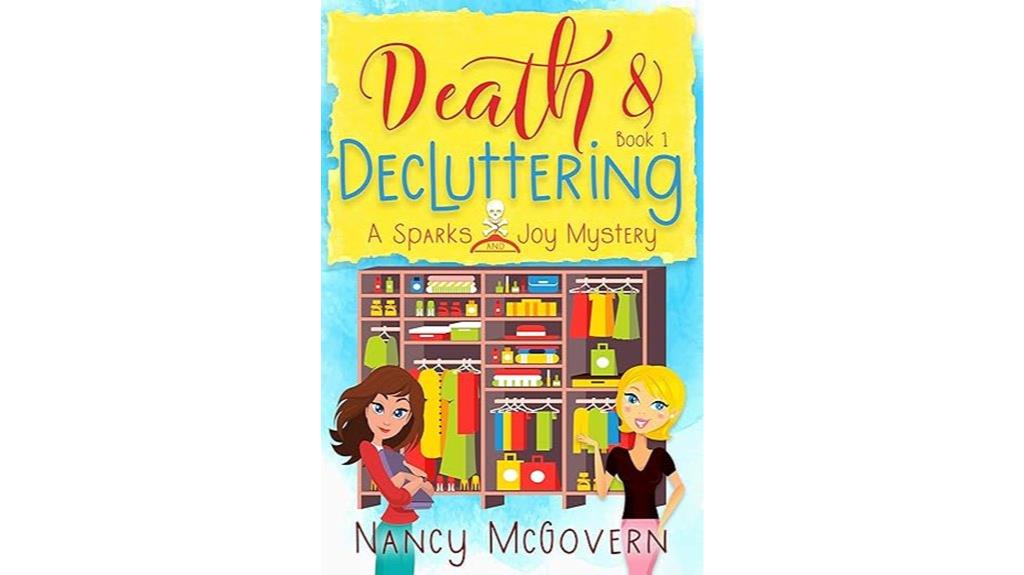
Readers who enjoy a blend of humor, mystery, and family dynamics will find "Death & Decluttering: A Good, Clean Cozy Mystery" an irresistible choice. Nancy McGovern's debut in the Spark & Joy series introduces Joy and Aurora, whose differing views on family lead to unexpected twists and turns. The engaging plot, featuring a quirky ostrich named Philbert, keeps you guessing until the end. I couldn't put it down, and the character development makes it relatable and heartfelt. If you're looking for a delightful escape that balances intrigue and laughter, this book is a must-read. You won't regret diving in!
Best For: Readers seeking a cozy mystery filled with humor, family dynamics, and unexpected twists will love "Death & Decluttering: A Good, Clean Cozy Mystery."
Pros:
- Engaging plot that balances mystery and humor, keeping readers entertained.
- Well-developed characters that evoke a range of emotions and relatability.
- Unique elements like Philbert the ostrich add charm and whimsy to the story.
Cons:
- Some readers may find the dual viewpoints distracting.
- A few twists might feel predictable to seasoned mystery readers.
- Certain family dynamics may not resonate with everyone, depending on personal experiences.
Decluttering Workbook: The Essential Guide to Organize and Declutter Your Home
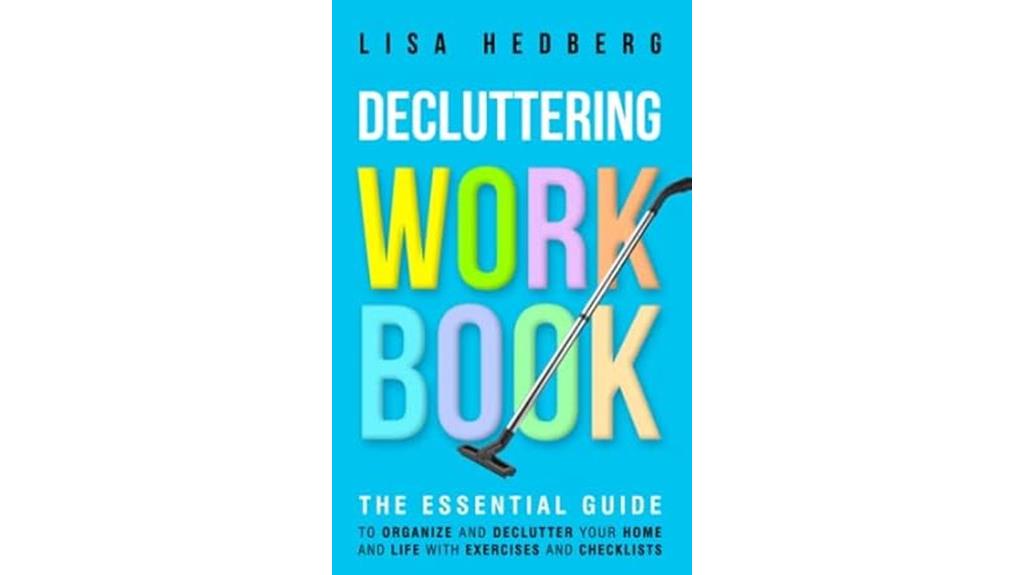
Struggling with clutter can feel overwhelming, but Lisa Hedberg's *Decluttering Workbook* is an ideal resource for anyone looking to reclaim their space and peace of mind. This workbook guides you through the decluttering process with empathy and practical advice. It emphasizes that decluttering isn't a one-time task but a lifestyle change. I appreciate the manageable steps and self-reflection it encourages. The first half focuses on personal insights, while the second half offers actionable exercises. Plus, the downloadable materials are a fantastic bonus. Overall, it's a thoughtful, engaging tool that's helped many—including me—transform our cluttered spaces into organized havens.
Best For: Individuals feeling overwhelmed by clutter who are seeking practical guidance to organize their homes and develop lasting habits.
Pros:
- Provides manageable steps and exercises, making the decluttering process feel less daunting.
- Combines personal insights with practical organizing strategies, addressing both mindset and action.
- Offers downloadable materials and an audiobook version for convenient access to content.
Cons:
- Some readers may find the focus on self-reflection and inner work less appealing if they prefer a more straightforward approach to organizing.
- The workbook may require a time commitment to complete the exercises at a meaningful pace.
- Not all readers may benefit equally, as results can vary based on individual circumstances and motivation levels.
Decluttering Mastery: 3 Books in 1
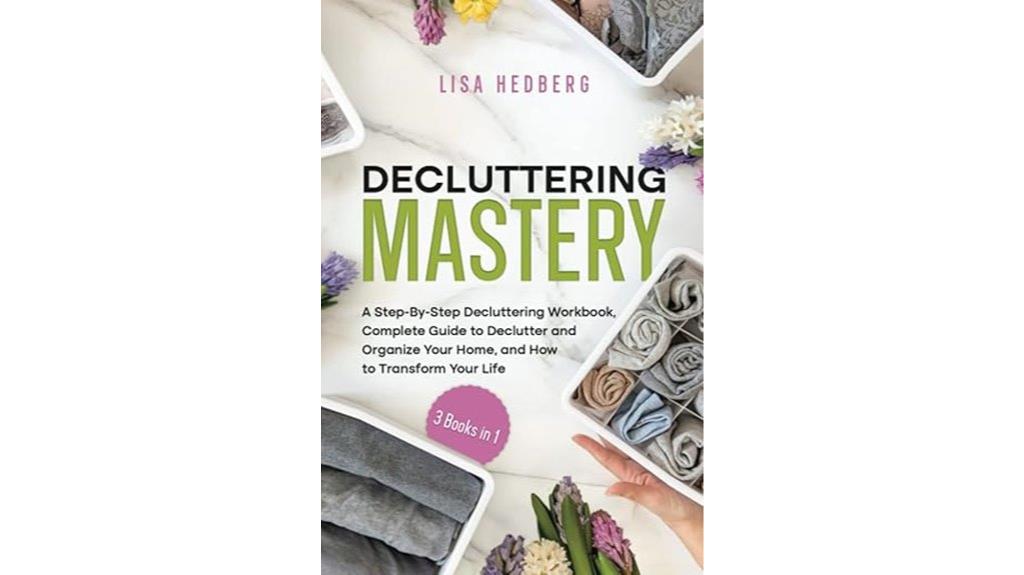
For anyone feeling overwhelmed by clutter in their living spaces, "Decluttering Mastery: 3 Books in 1" is the perfect resource. This thorough guide helped me regain control over my home and life. It's structured into three parts: a workbook, a decluttering guide, and a life transformation section. I loved the practical strategies, like the command-z solution and the 20/20 rule, which made tackling clutter manageable. Plus, it felt like having a supportive friend cheering me on. While some photos would've enhanced the experience, the actionable advice truly transformed my approach to organization. I highly recommend it!
Best For: Individuals feeling overwhelmed by clutter who seek practical guidance and motivation to regain control over their living spaces.
Pros:
- Engaging writing style that makes the decluttering process manageable and enjoyable.
- Practical strategies and techniques, such as the command-z solution and the 20/20 rule, that foster a proactive mindset.
- Comprehensive structure with checklists and action plans to enhance usability and motivation.
Cons:
- Some readers suggest that including photographs of organized spaces would enhance visual understanding.
- Minor complaints about formatting indicate room for improvement in presentation.
- May not provide enough depth for those already experienced in decluttering techniques.
Reclaim Your Life from Hoarding: Practical Strategies for Decluttering and Organizing Your Home
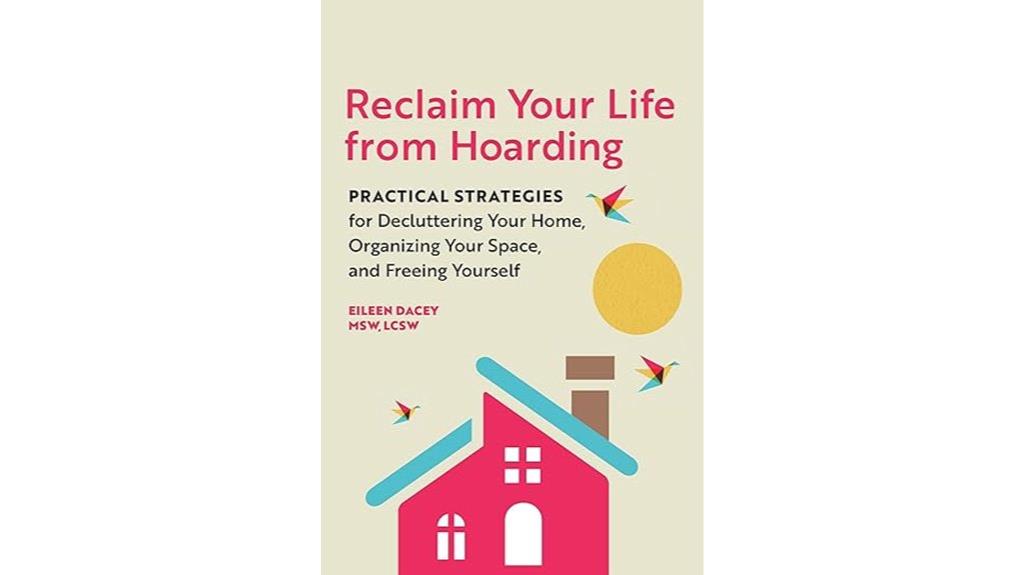
If you're feeling overwhelmed by clutter and unsure how to tackle it, "Reclaim Your Life from Hoarding" offers practical strategies that can make a real difference. This book explores the emotional aspects of hoarding, helping you understand your relationship with your belongings. The exercises within are particularly effective, guiding you through the unpacking process while addressing those emotions head-on. It's not just for self-identified hoarders; anyone struggling with clutter will find it useful. Many readers share transformative experiences, making this book a valuable resource for anyone looking to reclaim their space and, ultimately, their life.
Best For: This book is best for anyone feeling overwhelmed by clutter, including those not formally identifying as hoarders and families with elderly members facing hoarding issues.
Pros:
- Provides practical strategies and exercises for effective decluttering and organizing.
- Addresses the emotional aspects of hoarding, helping readers understand their attachment to belongings.
- Engaging presentation makes it an enjoyable read, with many readers reporting transformative experiences.
Cons:
- Some readers find the content repetitive and feel it reiterates previously published information.
- Unique suggestions, like locator beepers for misplaced items, may not resonate with everyone.
- A few readers did not finish the book, indicating it may not engage all audiences.
Factors to Consider When Choosing Decluttering Fun

When I think about choosing fun ways to declutter, I focus on a few key factors. It's important to take into account if the activities are age-appropriate, engaging, and provide the emotional support we all need. Plus, having practical tips and a way to track progress keeps me motivated throughout the process.
Age Appropriateness of Materials
Choosing age-appropriate decluttering materials is essential for ensuring that everyone involved can engage meaningfully with the process. For younger children, I find that colorful illustrations and interactive formats really spark their interest, making decluttering feel like a fun activity. As kids grow into middle childhood, I've noticed they benefit from more complex strategies that promote responsibility and independence. For teenagers, it's vital to address their emotional attachments and provide practical tips that help them manage their personal spaces. Finally, adults often need empathetic guidance that resonates with their life experiences, tackling the emotional aspects of decluttering. By selecting the right materials, we can create a more enjoyable and effective decluttering experience for everyone involved.
Engaging Interactive Elements
While decluttering might seem like a challenging task, incorporating engaging interactive elements can transform it into a fun and rewarding experience. I've found that gamified challenges and reward systems motivate me to tackle my clutter with enthusiasm. Visual aids, like before-and-after photos, make the process feel less intimidating and more inspiring. I love sorting and grouping items; it helps me visualize my progress and gives me a sense of accomplishment. Interactive journaling prompts encourage me to reflect on my emotional attachments to certain items, deepening my understanding of why I hold onto clutter. Finally, joining group decluttering sessions fosters a supportive atmosphere, turning a solitary task into a social event that boosts accountability and motivation.
Emotional Support and Understanding
Decluttering often stirs up a whirlwind of emotions, making it essential to seek emotional support and understanding throughout the process. I've found that having someone by my side can greatly ease feelings of guilt and attachment to items tied to memories. Recognizing my emotional triggers helps me confront my motivations and fears about letting go. Involving a supportive partner or community adds encouragement and accountability, making the journey feel less isolating. Practicing self-compassion and mindfulness allows me to navigate emotional challenges, fostering a healthier mindset towards my belongings. Understanding the psychological aspects of clutter empowers me to confront my behaviors, leading to more effective and lasting changes in my decluttering efforts. Let's embrace this journey together!
Practical Tips for Implementation
When I approach decluttering, I find that incorporating a bit of fun into the process can make a significant difference. I start by setting small, manageable goals, dedicating just 10-15 minutes to a specific area. This keeps me from feeling overwhelmed. To stay motivated, I use a reward system—treating myself after completing a task makes it more enjoyable. I also group like items together, which simplifies decisions and eases the emotional load. I make sure to incorporate breaks and practice self-care to maintain my mental well-being. Finally, keeping a journal or checklist helps me track progress and celebrate small victories, reinforcing my motivation and giving me a sense of accomplishment throughout the journey.
Motivation and Progress Tracking
One key factor that keeps me motivated during decluttering is tracking progress effectively. I set specific, achievable goals to create a structured plan, making the process feel less overwhelming. Celebrating small victories, like finishing a room or donating items, reinforces my motivation and keeps the momentum going. I love using visual aids; before-and-after photos remind me of how far I've come, fueling my desire to continue. Regularly reflecting on my reasons for decluttering helps, too—whether it's creating a more organized space or reducing stress. This reflection is especially vital during tougher moments when I need that extra push to keep going. By focusing on progress, I make decluttering a fun and rewarding journey.
Frequently Asked Questions
How Do I Stay Motivated During the Decluttering Process?
Staying motivated during the decluttering process can be tough, but I've found a few tricks that really help. I set small, achievable goals and celebrate each one I complete. I also play my favorite music to make the task feel more enjoyable. Visualizing the end result keeps me focused, and I remind myself of how good it feels to have a clutter-free space. Keeping it fun is key, and I stay committed to my progress!
What Should I Do With Items I Want to Keep but Don't Need?
When I come across items I want to keep but don't need, I assess their sentimental value first. If they hold special memories, I consider displaying them creatively or storing them in a designated box. For practical items, I often think about who could benefit from them. I've found that donating or gifting can bring me joy, knowing someone else will appreciate them. It's all about finding a balance that feels right for me.
How Can I Involve My Family in Decluttering Activities?
I've found that involving my family in decluttering can be a game changer. I usually set a fun theme, like a competition to see who can find the most items to donate. We make it a family event with music and snacks. I also encourage everyone to share stories about their items, which makes the process more meaningful. By turning it into a bonding experience, we all stay motivated and engaged together.
What Are Some Fun Decluttering Games for Kids?
When I first thought about decluttering with kids, I worried they'd find it boring, but I've discovered some fun games that really engage them. For instance, I turn sorting into a race—who can fill a box the fastest? Or I play "Treasure Hunt," where they find items to donate. Even making a game out of deciding what to keep can spark their interest. Kids love competition, and it makes decluttering enjoyable for everyone!
How Often Should I Declutter My Home?
I usually declutter my home every few months, but it depends on my lifestyle and how much stuff accumulates. I find it helpful to set aside a specific day for decluttering, so it doesn't feel overwhelming. I also make it a habit to reassess my belongings whenever the seasons change. This way, I keep my space organized and only hold onto what truly matters to me. Regular check-ins really help!
Conclusion
With these decluttering tips and fun resources, you can transform your home from a chaotic jungle into a serene sanctuary faster than you can say "Where'd I put my keys?" Imagine turning tedious organizing into a delightful adventure! Grab a book, set a timer, and watch as the clutter vanishes like magic! You'll be dancing through your sparkling space, celebrating every little victory. Let's embrace this journey and make decluttering your new favorite pastime!
